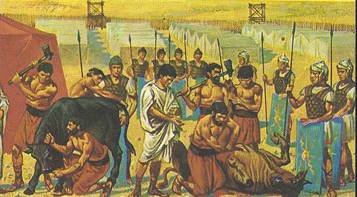IN 29 B.C. the gates of war were closed. Rome was at peace. Senators and the people of the mob-men who had hated and fought each other through long, bitter years — stood side by side in the Forum while the great doors of the temple of Janus were slowly pushed shut. That had happened only twice before in the history of the city. The crowd in the Forum cheered the peace and they cheered Octavius, their new ruler. He was no longer the young man who had rushed to Rome after the murder of his uncle, Caesar. Seventeen years …
Read More »Tag Archives: Tyrian Purple
The City of Aeneas 1000 B. C. – 500 B. C.
The minstrels who wandered from country to country in the ancient world told a legend of Aeneas, a Trojan prince. According to the story, Aeneas escaped the Greeks who broke through the walls of Troy and fled to his ships with a little band of warriors. Rowing out onto the Hellespont, they watched while a great fire destroyed their city and they knew that they could never return to Troy. Then, the storytellers said, the gods spoke to Aeneas, telling him to turn his ships west. They commanded him to sail away from the Hellespont and the Aegean Sea, past …
Read More »
